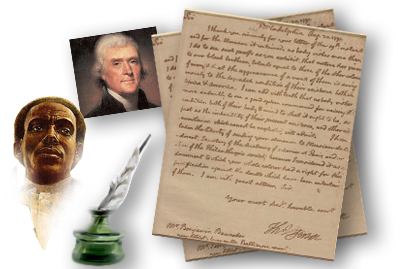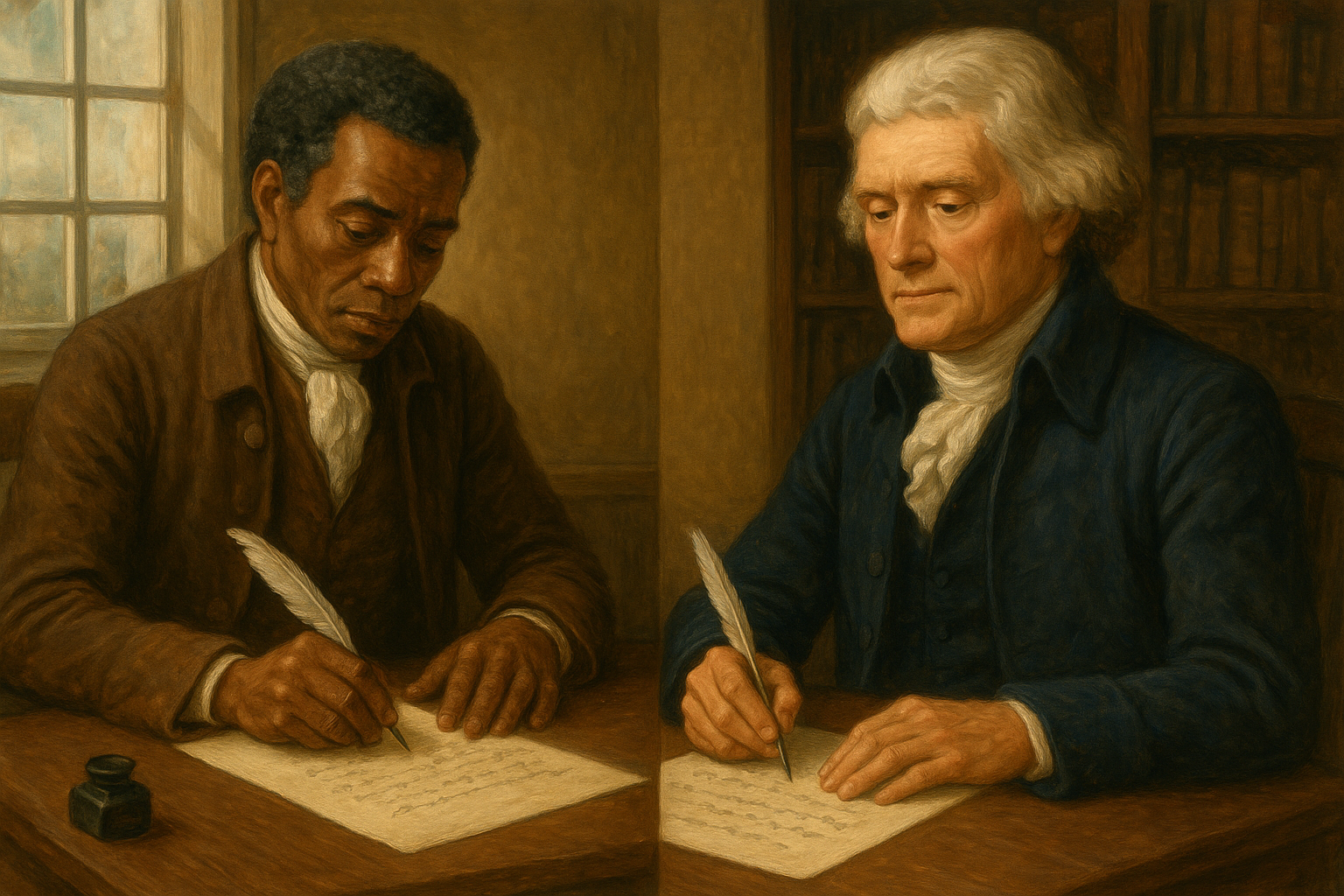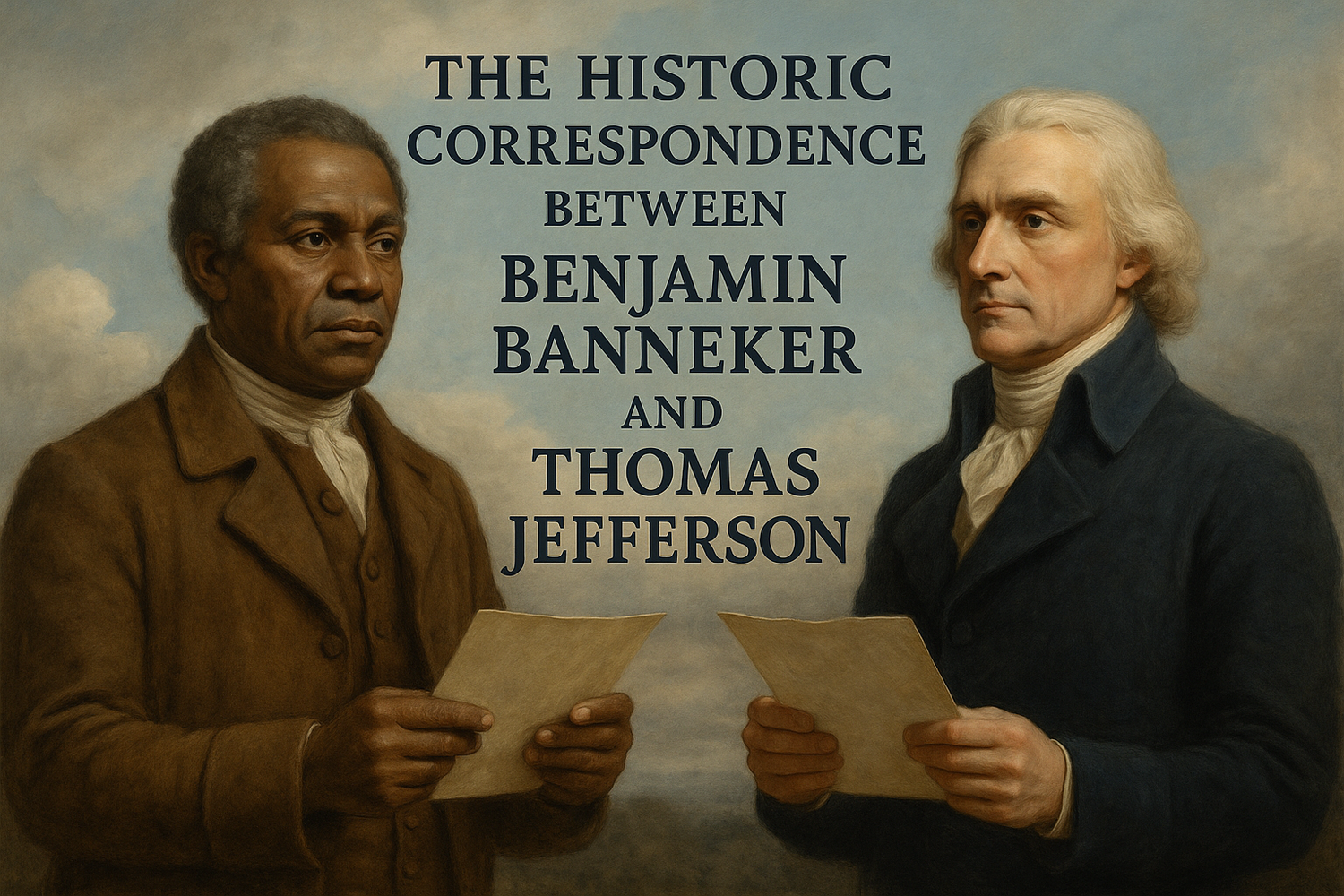Introduction to Benjamin Banneker
Benjamin Banneker (1731–1806) was a remarkable figure in early American history—a free African American born in Baltimore County, Maryland, who became a self-taught mathematician, astronomer, and almanac author. His almanacs, published in the 1790s, contained precise astronomical calculations, weather predictions, and practical information, earning him widespread recognition. Banneker also contributed to the survey of Washington, D.C., demonstrating his scientific expertise. His most notable act, however, was his 1791 letter to Thomas Jefferson, which challenged the contradictions between Jefferson’s advocacy for liberty and his ownership of slaves. This exchange, published in 1792, remains a significant historical document, reflecting Banneker’s intellect and courage in advocating for racial equality.
Historical Context
In 1791, the United States was a young nation grappling with its ideals of liberty while maintaining the institution of slavery. Thomas Jefferson, a key author of the Declaration of Independence, was Secretary of State and a prominent slaveholder. Banneker, aware of Jefferson’s public stance on freedom, used his letter to highlight the hypocrisy of slavery in a nation founded on equality. The publication of this correspondence in 1792, often associated with Banneker’s almanac, amplified its impact, serving as a public call for justice.

Honoring History Through Timepieces
At Banneker Watches, we believe every timepiece should tell a story. That’s why each of our watches contains real wood elements, honoring the brilliance and legacy of Benjamin Banneker (1731–1806) — mathematician, astronomer, abolitionist, and one of the most remarkable minds in American history.
One of the most powerful chapters of his life was his historic correspondence with Thomas Jefferson in 1791. In this exchange, Banneker challenged Jefferson’s views on slavery and equality while advocating for the dignity and potential of African Americans.
Below, you’ll find the full text of the Banneker–Jefferson letters, preserved exactly as written. These words still resonate today, reminding us that courage, intellect, and legacy are timeless.
Banneker’s Letter to Jefferson
On August 19, 1791, Banneker wrote to Jefferson from Maryland, enclosing a manuscript of his almanac for 1792. The letter is a respectful yet firm critique of slavery, referencing the Declaration of Independence’s assertion that “all men are created equal.” Banneker acknowledged his African heritage and his father’s history as a former slave, emphasizing the intellectual capabilities of African Americans. He urged Jefferson to reconsider his views, drawing parallels between the colonists’ fight against British oppression and the plight of enslaved African Americans.
Full Text of Banneker’s Letter:
Maryland. Baltimore County. Near Ellicotts Lower Mills August 19th. 1791
Thomas Jefferson Secretary of State
Sir
I am fully sensible of the greatness of that freedom which I take with you on the present occasion; a liberty which Seemed to me scarcely allowable, when I reflected on that distinguished, and dignifyed station in which you Stand; and the almost general prejudice and prepossession which is so prevailent in the world against those of my complexion.
I suppose it is a truth too well attested to you, to need a proof here, that we are a race of Beings who have long laboured under the abuse and censure of the world, that we have long been looked upon with an eye of contempt, and that we have long been considered rather as brutish than human, and Scarcely capable of mental endowments.
Sir I hope I may Safely admit, in consequence of that report which hath reached me, that you are a man far less inflexible in Sentiments of this nature, than many others, that you are measurably friendly and well disposed towards us, and that you are willing and ready to Lend your aid and assistance to our relief from those many distresses and numerous calamities to which we are reduced.
Now Sir if this is founded in truth, I apprehend you will readily embrace every opportunity to eradicate that train of absurd and false ideas and oppinions which so generally prevail with respect to us, and that your Sentiments are concurrent with mine, which are that one universal Father hath given being to us all, and that he hath not only made us all of one flesh, but that he hath also without partiality afforded us all the Same Sensations, and endued us all with the same faculties, and that however variable we may be in Society or religion, however diversifyed in Situation or colour, we are all of the Same Family, and Stand in the Same relation to him.
Sir, if these are Sentiments of which you are fully persuaded, I hope you cannot but acknowledge, that it is the indispensable duty of those who maintain for themselves the rights of human nature, and who profess the obligations of Christianity, to extend their power and influence to the relief of every part of the human race, from whatever burthen or oppression they may unjustly labour under, and this I apprehend a full conviction of the truth and obligation of these principles should lead all to.
Sir, I have long been convinced, that if your love for your Selves, and for those inesteemable laws which preserve to you the rights of human nature, was founded on Sincerity, you could not but be Solicitous, that every Individual of whatsoever rank or distinction, might with you equally enjoy the blessings thereof, neither could you rest Satisfyed, short of the most active diffusion of your exertions, in order to their promotion from any State of degradation, to which the unjustifyable cruelty and barbarism of men may have reduced them.
Sir I freely and Chearfully acknowledge, that I am of the African race, and in that colour which is natural to them of the deepest dye, and it is under a Sense of the most profound gratitude to the Supreme Ruler of the universe, that I now confess to you, that I am not under that State of tyrannical thraldom, and inhuman captivity, to which too many of my brethren are doomed; but that I have abundantly tasted of the fruition of those blessings which proceed from that free and unequalled liberty with which you are favoured and which I hope you will willingly allow you have received from the immediate Hand of that Being from whom proceedeth every good and perfect gift.
 Sir, Suffer me to recall to your mind that time in which the Arms and tyranny of the British Crown were exerted with every powerful effort in order to reduce you to a State of Servitude, look back I intreat you on the variety of dangers to which you were exposed, reflect on that time in which every human aid appeared unavailable, and in which even hope and fortitude wore the aspect of inability to the Conflict, and you cannot but be led to a Serious and grateful Sense of your miraculous and providential preservation; you cannot but acknowledge, that the present freedom and tranquility which you enjoy you have mercifully received, and that it is the peculiar blessing of Heaven.
Sir, Suffer me to recall to your mind that time in which the Arms and tyranny of the British Crown were exerted with every powerful effort in order to reduce you to a State of Servitude, look back I intreat you on the variety of dangers to which you were exposed, reflect on that time in which every human aid appeared unavailable, and in which even hope and fortitude wore the aspect of inability to the Conflict, and you cannot but be led to a Serious and grateful Sense of your miraculous and providential preservation; you cannot but acknowledge, that the present freedom and tranquility which you enjoy you have mercifully received, and that it is the peculiar blessing of Heaven.
This Sir, was a time in which you clearly saw into the injustice of a State of Slavery, and in which you had Just apprehensions of the horrors of its condition, it was now Sir, that your abhorrence thereof was so excited, that you publickly held forth this true and invaluable doctrine, which is worthy to be recorded and remember’d in all Succeeding ages. “We hold these truths to be Self evident, that all men are created equal, and that they are endowed by their creator with certain unalienable rights, that among these are life, liberty, and the pursuit of happyness.”
Here Sir, was a time in which your tender feelings for your selves had engaged you thus to declare, you were then impressed with proper ideas of the great valuation of liberty, and the free possession of those blessings to which you were entitled by nature; but Sir how pitiable is it to reflect, that altho you were so fully convinced of the benevolence of the Father of mankind, and of his equal and impartial distribution of those rights and privileges which he had conferred upon them, that you should at the Same time counteract his mercies, in detaining by fraud and violence so numerous a part of my brethren under groaning captivity and cruel oppression, that you should at the Same time be found guilty of that most criminal act, which you professedly detested in others, with respect to yourselves.
Sir, I suppose that your knowledge of the situation of my brethren is too extensive to need a recital here; neither shall I presume to prescribe methods by which they may be relieved; otherwise than by recommending to you and all others, to wean yourselves from those narrow prejudices which you have imbibed with respect to them, and as Job proposed to his friends “Put your Souls in their Souls stead,” thus shall your hearts be enlarged with kindness and benevolence toward them, and thus shall you need neither the direction of myself or others in what manner to proceed herein.
And now Sir, altho my Sympathy and affection for my brethren hath caused my enlargement thus far, I ardently hope that your candour and generosity will plead with you in my behalf, when I make known to you, that it was not originally my design; but that having taken up my pen in order to direct to you as a present, a copy of an Almanack which I have calculated for the Succeeding year, I was unexpectedly and unavoidably led thereto.
This calculation, Sir, is the production of my arduous Study in this my advanced Stage of life; for having long had unbounded desires to become acquainted with the Secrets of nature, I have had to gratify my curiosity herein thro my own assiduous application to Astronomical Study, in which I need not to recount to you the many difficulties and disadvantages which I have had to encounter.
And altho I had almost declined to make my calculation for the ensuing year, in consequence of that time which I had allotted therefor being taken up at the Federal Territory by the request of Mr. Andrew Ellicott, yet finding myself under Several engagements to printers of this state to whom I had communicated my design, on my return to my place of residence, I industriously apply’d myself thereto, which I hope I have accomplished with correctness and accuracy, a copy of which I have taken the liberty to direct to you, and which I humbly request you will favourably receive, and altho you may have the opportunity of perusing it after its publication, yet I chose to send it to you in manuscript previous thereto, that thereby you might not only have an earlier inspection, but that you might also view it in my own hand writing.—And now Sir, I shall conclude and Subscribe my Self with the most profound respect your most Obedient humble Servant,
Benjamin Banneker
NB any communication to me may be had by a direction to Mr. Elias Ellicott merchant in Baltimore Town.
B B
As an Essay of my calculation is put into the Hand of Mr. Cruckshank of philadelphia, for publication I would wish that you might neither have this Almanack copy published nor give any printer an opportunity thereof, as it might tend to prevent the sale of the Almanack when published, and I do not doubt but Mr. Ellicott will communicate to you the one that is to be published.
I am Sir your most obedient Servant
B. Banneker
To Thomas Jefferson Esquire Secretary of State Philadelphia
Source: Bill of Rights Institute
Jefferson’s Response
Jefferson responded on August 30, 1791, from Philadelphia, thanking Banneker for the almanac and expressing hope that it would demonstrate the intellectual equality of African Americans. He mentioned forwarding the almanac to the Marquis de Condorcet, a French philosopher and advocate for racial equality, to counter prevailing doubts about Black capabilities. However, Jefferson’s later writings, such as a 1809 letter to Joel Barlow, suggest he doubted Banneker’s independent authorship of the almanac, revealing his complex views on race.
Full Text of Jefferson’s Response:
Philadelphia Aug. 30. 1791.
Sir,
I thank you sincerely for your letter of the 19th instant and for the Almanac it contained. No body wishes more than I do to see such proofs as you exhibit, that nature has given to our black brethren, talents equal to those of the other colours of men, and that the appearance of a want of them is owing merely to the degraded condition of their existence both in Africa and America. I can add with truth that no body wishes more than I do to see a good system commenced for raising the condition both of their body and mind to what it ought to be, as fast as the imbecillity of their present existence, and other circumstances which cannot be neglected, will admit.—I have taken the liberty of sending your almanac to Monsieur de Condorcet, Secretary of the Academy of sciences at Paris, and member of the Philanthropic society because I considered it as a document to which your whole colour had a right for their justification against the doubts which have been entertained of them.
I am with great esteem, Sir Your most obedt. humble servt.,
Th: Jefferson
Source: Founders Online
Publication in Banneker’s Almanac
The correspondence was published in 1792 in a pamphlet titled Copy of a Letter from Benjamin Banneker to the Secretary of State, with His Answer, printed by Daniel Lawrence in Philadelphia. This publication, often associated with Banneker’s almanac, included both letters and an account of Banneker’s life, emphasizing his contributions and the antislavery message of the exchange. The Library of Congress holds a copy of this document, accessible at Library of Congress.
Significance and Controversy
This exchange is significant for its rare direct challenge to a founding father by an African American during the era. Banneker’s letter is a powerful articulation of the hypocrisy of slavery in a nation founded on liberty, while Jefferson’s response reflects the complexities of his views. Historians note that Jefferson’s later skepticism about Banneker’s abilities, as expressed in 1809, underscores the contradictions in his stance on race. The correspondence remains a debated topic, with some praising Banneker’s boldness and others critiquing Jefferson’s limited action on slavery. Recent discussions, including on social media, highlight the letter’s enduring relevance as a critique of racial injustice.
Why This Correspondence Still Matters
The Banneker–Jefferson letters are more than history — they are a testament to speaking truth to power and fighting for justice through intellect and reason. For us at Banneker Watches, they symbolize the resilience and brilliance of Benjamin Banneker, a man who not only calculated eclipses and designed America’s first clock but also stood as a voice for freedom and equality.
|
Aspect |
Details |
|
Date of Banneker’s Letter |
August 19, 1791 |
|
Date of Jefferson’s Response |
August 30, 1791 |
|
Publication |
1792, in Almanac, a copy of a Letter from Benjamin Banneker to the Secretary of State, along with His Answer |
|
Key Themes |
Racial equality, critique of slavery, intellectual capability, Declaration of Independence |
|
Publisher |
Daniel Lawrence, Philadelphia |
|
Archival Sources |
Founders Online, Library of Congress |
Banneker Watches: Honoring a Legacy
Inspired by Benjamin Banneker’s legacy, Banneker watches celebrate his contributions to science and his advocacy for equality. Crafted from real luxury wood, these timepieces pay homage to Banneker’s historic achievement of building the first striking clock in America in 1753 using hand-carved wood parts. Each watch is a blend of history and modern design, symbolizing precision and elegance. Available at bannekerstore.com, our watches serve as a tribute to his enduring impact, connecting his historical significance to contemporary craftsmanship. Discover our collection today and wear a piece of history that embodies Banneker’s spirit of innovation and equality.
Conclusion
The correspondence between Benjamin Banneker and Thomas Jefferson is a pivotal moment in American history, highlighting the struggle for racial equality and the intellectual achievements of a remarkable individual. Banneker’s courage in challenging Jefferson’s views, coupled with his scientific contributions, continues to inspire. To honor his legacy, we invite you to explore our collection of Banneker watches at BannekerStore.com, where each timepiece is a testament to his precision and dedication to justice.
? Explore the Banneker Watches Collection and celebrate a story of pride, courage, and legacy every time you check the time.
Citations
- Founders Online: To Thomas Jefferson from Benjamin Banneker, 19 August 1791
- Founders Online: From Thomas Jefferson to Benjamin Banneker, 30 August 1791
- Library of Congress: Copy of a Letter from Benjamin Banneker to the Secretary of State, with His Answer
- PBS: Africans in America, Banneker’s Letter to Jefferson
- PBS: Africans in America, Jefferson’s Reply to Banneker
- Bill of Rights Institute: Handout A: Benjamin Banneker’s Letter to Thomas Jefferson (August 19, 1791)

